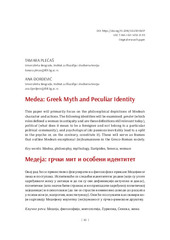| dc.creator | Plećaš, Tamara | |
| dc.creator | Đorđević, Ana | |
| dc.date.accessioned | 2023-07-12T10:44:55Z | |
| dc.date.available | 2023-07-12T10:44:55Z | |
| dc.date.issued | 2023 | |
| dc.identifier.issn | 0350-0861 | |
| dc.identifier.uri | https://doiserbia.nb.rs/img/doi/0350-0861/2023/0350-08612301045P.pdf | |
| dc.identifier.uri | http://rifdt.instifdt.bg.ac.rs/123456789/2849 | |
| dc.description.abstract | This paper will primarily focus on the philosophical depictions of Medea’s character and actions. The following identities will be examined: gender (which roles defined a woman in antiquity and are these definitions still relevant today), political (what does it mean to be a foreigner and not belong to a particular political community), and psychological (do passions inevitably lead to a split in the psyche or, on the contrary, constitute it). These will serve as frames that outline Medea’s exceptional (in)humanness in the Greco-Roman society. | sr |
| dc.language.iso | en | sr |
| dc.publisher | Beograd: Etnografski institut SANU | sr |
| dc.relation | Ministarstvo prosvete, nauke i tehnološkog razvoja Republike Srbije, Ugovor br. 200025 (Univerzitet u Beogradu, Institut za filozofiju i društvenu teoriju) (RS-200025) | sr |
| dc.rights | openAccess | sr |
| dc.rights.uri | https://creativecommons.org/licenses/by/4.0/ | |
| dc.source | Glasnik Etnografskog instituta SANU | sr |
| dc.subject | Medea | sr |
| dc.subject | philosophy | sr |
| dc.subject | mythology | sr |
| dc.subject | Euripides | sr |
| dc.subject | Seneca | sr |
| dc.subject | woman | sr |
| dc.title | Medea: Greek myth and peculiar identity | sr |
| dc.type | article | sr |
| dc.rights.license | BY | sr |
| dc.citation.issue | 1 | |
| dc.citation.volume | 71 | |
| dc.citation.spage | 45 | |
| dc.citation.epage | 62 | |
| dc.identifier.doi | 10.2298/GEI2301045P | |
| dc.type.version | publishedVersion | sr |
| dc.identifier.fulltext | http://rifdt.instifdt.bg.ac.rs/bitstream/id/9851/0350-08612301045P.pdf | |

